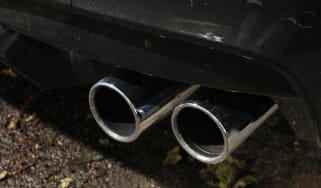Electric car tax cuts needed to boost sales, says SMMT
The Chancellor is under pressure to slash VAT on new EVs to provide a ‘fair tax for a fair transition’

The car industry is urging the Chancellor of the Exchequer to cut the price of new electric cars for private buyers, via a hefty 50 per cent discount on the rate of VAT. This, it says, would see average EV prices drop by £4,000 and boost EV sales by 270,000 over three years.
The call comes as new research for the Society of Motor Manufacturers and Traders (SMMT) shows that almost half of the would-be electric car buyers are intending to wait until after 2030 to make the switch from their internal combustion-powered models, a number that has shot up from just 10 per cent last year before the new petrol and diesel car ban was delayed.
The SMMT points to a 19 per cent year-on-year drop in private sales of EVs to private buyers in 2023, and says its research shows a third of drivers perceive upfront cost as their biggest concern. The industry trade body says a 50 per cent VAT cut should be backed up by changes to road tax to avoid disincentivising EVs, and a cut to VAT on public charging to help reassure motorists over their cost concerns.
Latest SMMT survey data reveals that Rishi Sunak’s decision last December to delay the ban on selling new petrol and diesel models from 2030 to 2035 has significantly dented the keenness of drivers to make the transition to EVs. It says that 24 per cent of drivers admit to delaying their own plans, while 14 per cent don’t believe they’ll make the transition at all.
While the number of EVs on the road continues to rise thanks to strong fleet sales, the rate of growth has slowed and market share for EVs has stabilised at around 16 per cent, the SMMT says. That’s a big headache for manufacturers who are compelled by the Zero Emissions Vehicle mandate to reach a 22 per cent EV market share this year, and their biggest problem is private buyers, with so-called ‘retail sales’ in decline since 2022.
“The upcoming Budget is an opportunity to put Britain’s electric switch back on track, supporting drivers to go green by halving VAT on new EVs, changing upcoming Vehicle Excise Duty rates so EVs are treated as essentials, not luxuries, and giving drivers more affordable public charging,” the SMMT says. The industry body says its survey data shows 37 per cent of drivers interested in switching to EVs would “accelerate their plans” following a VAT cut, and 25 per cent of drivers not interested in switching said it was the option most likely to make them change their minds.
According to the SMMT, cutting VAT on car purchases would save individual buyers around £4,000 each, while costing the Treasury less than the now scrapped Plug-in Car Grant.
The SMMT is also concerned about the forthcoming changes to road tax rates, that from April will see around 70 per cent of all EVs on sale falling foul of the £40,000-plus ‘expensive car’ VED supplement of £390 per year - a total penalty of £1,950 for choosing to go electric. VAT on public charging is also in the SMMT’s firing line, and it’s calling for a reduction from the current 20 per cent to five per cent, in line with the VAT on home charging.
“The Budget is a crucial opportunity to re-energise the EV market, with fair tax for a fair transition. The Chancellor must end the perverse fiscal system that discourages drivers from moving away from fossil fuels and send a clear signal that the time to go electric is now,” SMMT chief executive Mike Hawes said. “Success will see our economy powered up by zero emission mobility, delivering cleaner air, quieter roads and cheaper running costs, ending the uncertainty we are seeing amongst motorists.”
Do you think electric cars should be cheaper? Let us know your thoughts in the comments section...
Find a car with the experts








